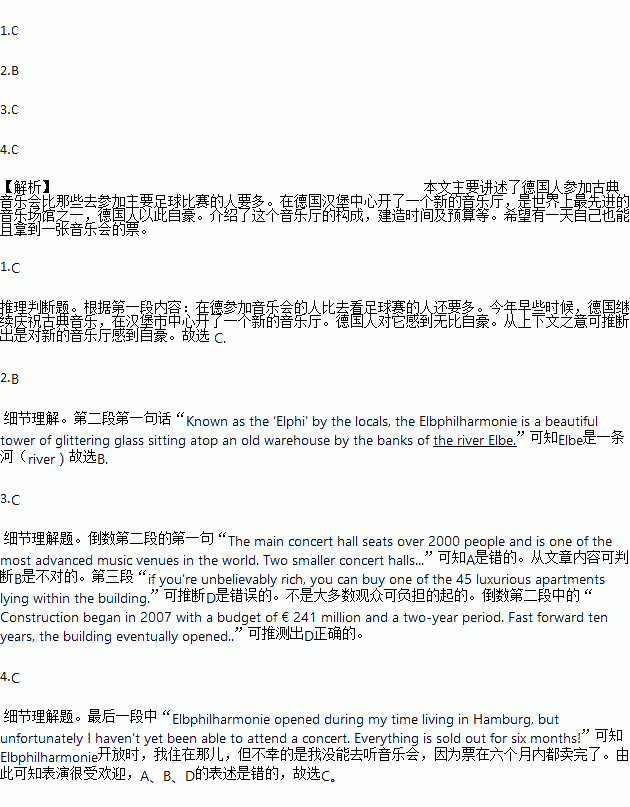题目内容
Did you know that, in 2016, over 18 million people attended classical concerts in Germany? That’s more people than those who went to main league football matches! Earlier this year, Germany continued its celebration of classical music with the opening of a new concert hall in the heart of Hamburg. Germans are incredibly proud of it and it’s the first thing I show to my friends when they come to visit.
Known as the ‘Elphi’ by the locals, the Elbphilharmonie is a beautiful tower of glittering glass sitting atop an old warehouse by the banks of the river Elbe. The plaza(露天广场)is open to the public an from the middle of the city’s tallest building, you can gaze across the harbour, miles of rooftops and passing ships below.
The main concert hall seats over 2000 people and is one of the most advanced music venues in the world. Two smaller concert halls are used for jazz, world and contemporary music. In addition, if you’re unbelievably rich, you can buy one of the 45 luxurious apartments lying within the building.
Construction began in 2007 with a budget of ?241 million and a two-year period. Fast forward ten years, the building eventually opened with a final price tag of over 800 million!
I consider myself very lucky that the Elbphilharmonie opened during my time living in Hamburg, but unfortunately I haven’t yet been able to attend a concert. Everything is sold out for six months! For now, I’m content to visit the plaza to enjoy the impressive view over the docks and see the innovative architecture up close. Hopefully one day soon, I’ll be lucky enough to grab a last-minute concert ticket!
1.What does “it” in Paragraph 1 refer to?
A. Germany B. Hamburg
C. A new concert hall D. Its celebration of classical music
2.What is Elbe?
A. A hall B. A river
C. A tower D. A warehouse
3.What can we learn from the last two paragraphs?
A. The new concert hall can hold 3000 people at least
B. The construction of the new concert hall is perfect
C. It took a longer time and more money to build the concert hall
D. The majority of audience are likely to pay for the luxurious apartments
4.What happed after the Elbphilharmonie opened?
A. I was invited to visit it
B. Few concerts have been held
C. The performance was well received
D. People find it easy to get concert tickets
 口算能手系列答案
口算能手系列答案
